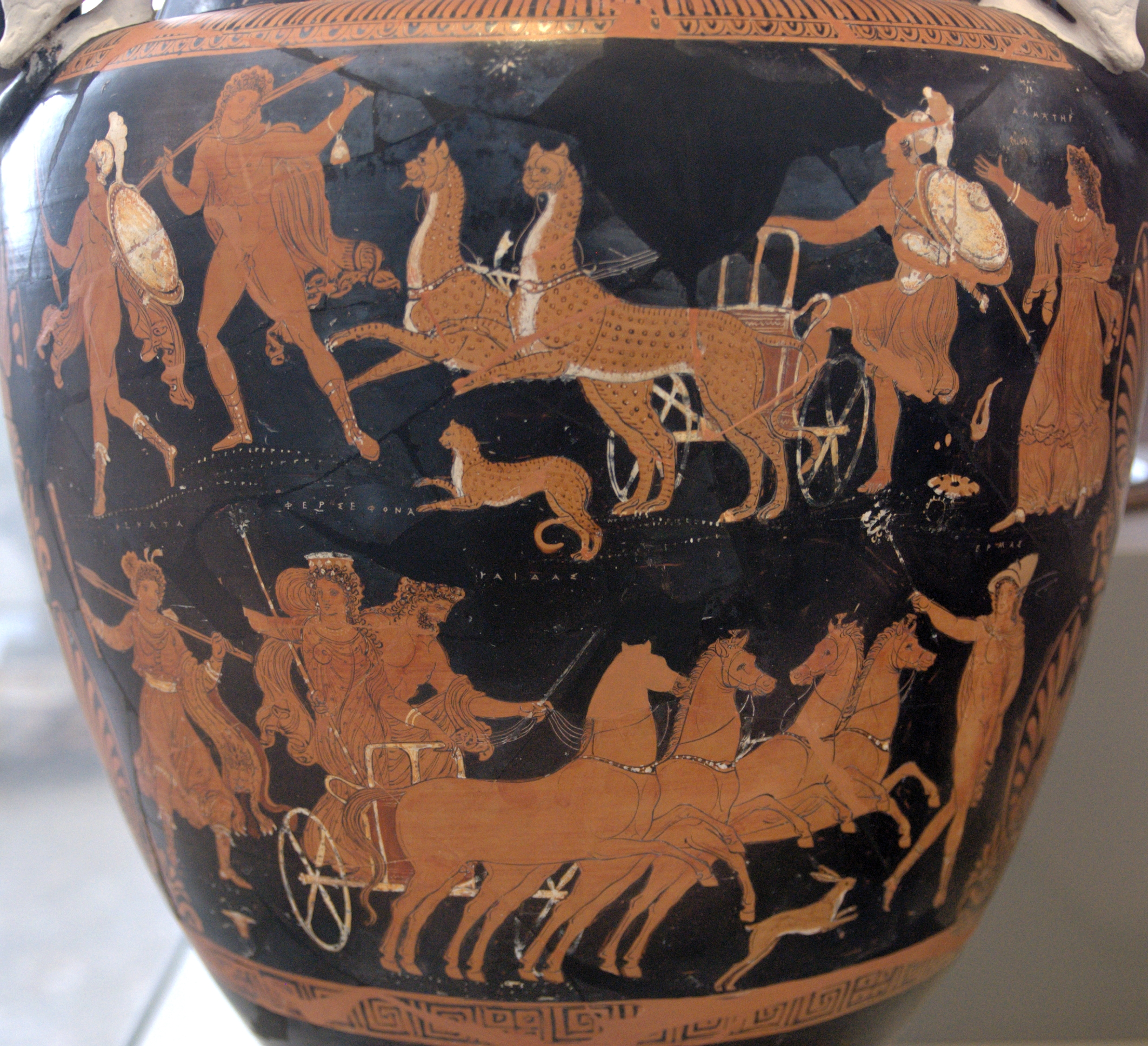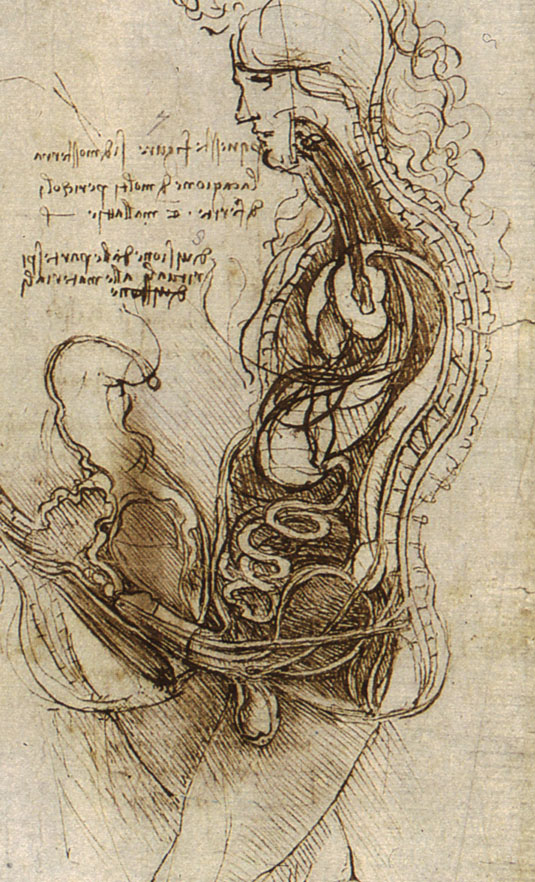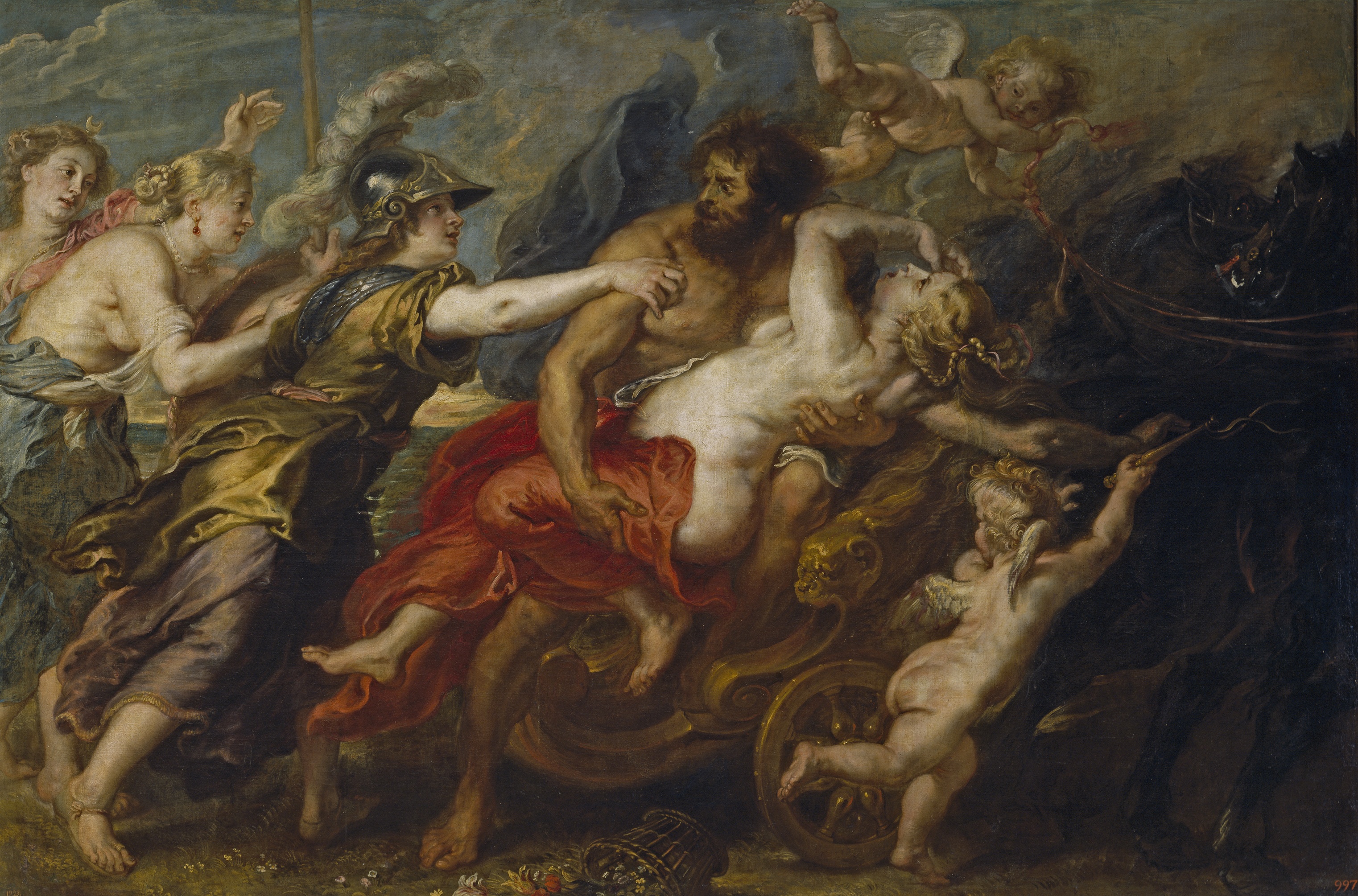|
Rape Of Persephone
The Rape of Persephone, or Abduction of Persephone, is a classical mythological subject in Western art, depicting the abduction of Persephone by Hades. This then resulted in the myth surrounding the creation of the seasons, as Demeter mourned the time that Persephone spent in the Underworld with her husband. In the context of the subject, the word "Rape" refers to the traditional translation of the Latin raptus, "seized" or "carried off", and not to sexual violence. Mythological background Persephone is the daughter of Zeus and Demeter. Hades wished to make her his wife, so he got permission from her father Zeus and help from Gaia to abduct her into the Underworld. When Persephone was picking flowers in a field, Hades emerged on his chariot from a crack on the earth, and carried off the unwilling Persephone; only Hecate and Helios witnessed the abduction, and later told Demeter. Rubens Created in 1636 and 1637, Peter Paul Rubens depicted the abduction of Persephone in a pie ... [...More Info...] [...Related Items...] OR: [Wikipedia] [Google] [Baidu] |
Persephone
In ancient Greek mythology and religion, Persephone ( ; gr, Περσεφόνη, Persephónē), also called Kore or Cora ( ; gr, Κόρη, Kórē, the maiden), is the daughter of Zeus and Demeter. She became the queen of the underworld after her abduction by and marriage to her uncle Hades, the king of the underworld.Martin Nilsson (1967). ''Die Geschichte der Griechische Religion'' Vol I pp 462–463, 479–480 The myth of her abduction, her sojourn in the underworld, and her temporary return to the surface represents her functions as the embodiment of spring and the personification of vegetation, especially grain crops, which disappear into the earth when sown, sprout from the earth in spring, and are harvested when fully grown. In Classical Greek art, Persephone is invariably portrayed robed, often carrying a sheaf of grain. She may appear as a mystical divinity with a sceptre and a little box, but she was mostly represented in the process of being carried off by Hades. ... [...More Info...] [...Related Items...] OR: [Wikipedia] [Google] [Baidu] |
Gemäldegalerie, Berlin
The Gemäldegalerie (, ''Painting Gallery'') is an art museum in Berlin, Germany, and the museum where the main selection of paintings belonging to the Berlin State Museums (''Staatliche Museen zu Berlin'') is displayed. It was first opened in 1830, and the current building was completed in 1998. It is located in the Kulturforum museum district west of Potsdamer Platz. It holds one of the world's leading collections of European paintings from the 13th to the 18th centuries. Its collection includes masterpieces from such artists as Albrecht Dürer, Lucas Cranach, Hans Holbein, Rogier van der Weyden, Jan van Eyck, Raphael, Botticelli, Titian, Caravaggio, Peter Paul Rubens, David Teniers the Younger, Rembrandt, Johannes Vermeer, Thomas Gainsborough, Joshua Reynolds and Antonio Viviani. Collection The Gemäldegalerie prides itself on its scientific methodology in collecting and displaying art. Each room can be taken in as a single statement about one to five artists ... [...More Info...] [...Related Items...] OR: [Wikipedia] [Google] [Baidu] |
Deeds Of Demeter
Deeds may refer to: *Deed, a legal instrument used to grant a right. *Deeds (Software), a software package for designing and simulating digital systems *Sen. Creigh Deeds, an American politician, member of the Virginia Senate and Democratic Nominee for the 2009 Gubinatorial race of the Commonwealth of Virginia. *''Mr. Deeds Goes to Town'', a 1936 comedy film starring Gary Cooper. *''Mr. Deeds'', a 2002 remake of ''Mr Deeds Goes to Town'' starring Adam Sandler. {{disambig ... [...More Info...] [...Related Items...] OR: [Wikipedia] [Google] [Baidu] |
Deeds Of Zeus
Deeds may refer to: *Deed, a legal instrument used to grant a right. *Deeds (Software), a software package for designing and simulating digital systems *Sen. Creigh Deeds, an American politician, member of the Virginia Senate and Democratic Nominee for the 2009 Gubinatorial race of the Commonwealth of Virginia. *''Mr. Deeds Goes to Town'', a 1936 comedy film starring Gary Cooper. *''Mr. Deeds'', a 2002 remake of ''Mr Deeds Goes to Town'' starring Adam Sandler. {{disambig ... [...More Info...] [...Related Items...] OR: [Wikipedia] [Google] [Baidu] |
Sexuality In Ancient Greece
The social construction of human sexuality and sexual behavior—along with its taboos, regulation, and social and political impact—has had a profound effect on the various cultures of the world since prehistoric times. The study of the history of human sexuality The work of Swiss jurist Johann Bachofen made a major impact on the study of the history of sexuality. Many authors, notably Lewis Henry Morgan and Friedrich Engels, were influenced by Bachofen, and criticized Bachofen's ideas on the subject, which were almost entirely drawn from a close reading of ancient mythology. In his 1861 book ''Mother Right: An Investigation of the Religious and Juridical Character of Matriarchy in the Ancient World'' Bachofen writes that in the beginning human sexuality was chaotic and promiscuous. This "aphroditic" stage was replaced by a matriarchal "demeteric" stage, which resulted from the mother being the only reliable way of establishing descendants. Only upon the switch to male-enfor ... [...More Info...] [...Related Items...] OR: [Wikipedia] [Google] [Baidu] |
Mythological Rape Victims
Myth is a folklore genre consisting of narratives that play a fundamental role in a society, such as foundational tales or origin myths. Since "myth" is widely used to imply that a story is not objectively true, the identification of a narrative as a myth can be highly controversial. Many adherents of religions view their own religions' stories as truth and so object to their characterization as myth, the way they see the stories of other religions. As such, some scholars label all religious narratives "myths" for practical reasons, such as to avoid depreciating any one tradition because cultures interpret each other differently relative to one another. Other scholars avoid using the term "myth" altogether and instead use different terms like "sacred history", "holy story", or simply "history" to avoid placing pejorative overtones on any sacred narrative. Myths are often endorsed by secular and religious authorities and are closely linked to religion or spirituality. Many soci ... [...More Info...] [...Related Items...] OR: [Wikipedia] [Google] [Baidu] |
Rape Of Persephone
The Rape of Persephone, or Abduction of Persephone, is a classical mythological subject in Western art, depicting the abduction of Persephone by Hades. This then resulted in the myth surrounding the creation of the seasons, as Demeter mourned the time that Persephone spent in the Underworld with her husband. In the context of the subject, the word "Rape" refers to the traditional translation of the Latin raptus, "seized" or "carried off", and not to sexual violence. Mythological background Persephone is the daughter of Zeus and Demeter. Hades wished to make her his wife, so he got permission from her father Zeus and help from Gaia to abduct her into the Underworld. When Persephone was picking flowers in a field, Hades emerged on his chariot from a crack on the earth, and carried off the unwilling Persephone; only Hecate and Helios witnessed the abduction, and later told Demeter. Rubens Created in 1636 and 1637, Peter Paul Rubens depicted the abduction of Persephone in a pie ... [...More Info...] [...Related Items...] OR: [Wikipedia] [Google] [Baidu] |
Gian Lorenzo Bernini
Gian Lorenzo (or Gianlorenzo) Bernini (, , ; Italian Giovanni Lorenzo; 7 December 159828 November 1680) was an Italian sculptor and architect. While a major figure in the world of architecture, he was more prominently the leading sculptor of his age, credited with creating the Baroque style of sculpture. As one scholar has commented, "What Shakespeare is to drama, Bernini may be to sculpture: the first pan-European sculptor whose name is instantaneously identifiable with a particular manner and vision, and whose influence was inordinately powerful ..." In addition, he was a painter (mostly small canvases in oil) and a man of the theater: he wrote, directed and acted in plays (mostly Carnival satires), for which he designed stage sets and theatrical machinery. He produced designs as well for a wide variety of decorative art objects including lamps, tables, mirrors, and even coaches. As an architect and city planner, he designed secular buildings, churches, chapels, and publi ... [...More Info...] [...Related Items...] OR: [Wikipedia] [Google] [Baidu] |
The Rape Of Proserpina (Bernini)
''The Rape of Proserpina'' ( it, Ratto di Proserpina), more accurately translated as ''the Abduction of Proserpina'', is a large Baroque marble group sculpture by Italian artist Gian Lorenzo Bernini, executed between 1621 and 1622, when Bernini's career was in its early stage. The group, finished when Bernini was just 23 years old, depicts the abduction of Proserpina, who is seized and taken to the underworld by the god Pluto. It features a Pluto holding a Proserpina aloft, and a Cerberus to symbolize the border into the underworld that Pluto carries Proserpina into. Cardinal Scipione Borghese commissioned the sculpture and gave it to the newly-appointed Cardinal-nephew, Ludovico Ludovisi, possibly as a means of gaining favor. The choice to depict the myth of Proserpina may relate to the recent death of Pope Paul V, or to the recent empowerment of Ludovico. Bernini drew heavy inspiration from Giambologna and Annibale Carracci for the sculpture, which is also the only work for w ... [...More Info...] [...Related Items...] OR: [Wikipedia] [Google] [Baidu] |
Piccolomini Library
Siena Cathedral ( it, Duomo di Siena) is a medieval church in Siena, Italy, dedicated from its earliest days as a Roman Catholic Marian church, and now dedicated to the Assumption of Mary. It was the episcopal seat of the Diocese of Siena, and from the 15th century that of the Archdiocese of Siena. It is now the seat of the Archdiocese of Siena-Colle di Val d'Elsa-Montalcino. The cathedral was designed and completed between 1215 and 1263 on the site of an earlier structure. It has the form of a Latin cross with a slightly projecting transept, a dome and a bell tower. The dome rises from a hexagonal base with supporting columns. The dome was completed in 1264. The lantern atop the dome was added by Gian Lorenzo Bernini. The bell tower has six bells, where the oldest one was cast in 1149. The nave is separated from the two aisles by semicircular arches. The exterior and interior are constructed of white and greenish-black marble in alternating stripes, with the addition of red mar ... [...More Info...] [...Related Items...] OR: [Wikipedia] [Google] [Baidu] |
Pinturicchio
Pinturicchio, or Pintoricchio (, ; born Bernardino di Betto; 1454–1513), also known as Benetto di Biagio or Sordicchio, was an Italian painter during the Renaissance. He acquired his nickname (meaning "little painter") because of his small stature and he used it to sign some of his artworks that were created during the fifteenth and sixteenth centuries."PINTURICCHIO." ''Benezit Dictionary of Artists''. ''Oxford Art Online''. Oxford University Press. Web. 14 February 2017. . Biography Early years Pinturicchio was born the son of Benedetto or Betto di Biagio, in Perugia. In his career, he may have trained under lesser known Perugian painters such as Bonfigli and Fiorenzo di Lorenzo. According to Vasari, Pinturicchio was a paid assistant of Perugino. The works of the Perugian Renaissance school are very similar and often paintings by Perugino, Pinturicchio, Lo Spagna, and a young Raphael may be mistaken, one for the other. In the execution of large frescoes, pupils an ... [...More Info...] [...Related Items...] OR: [Wikipedia] [Google] [Baidu] |







